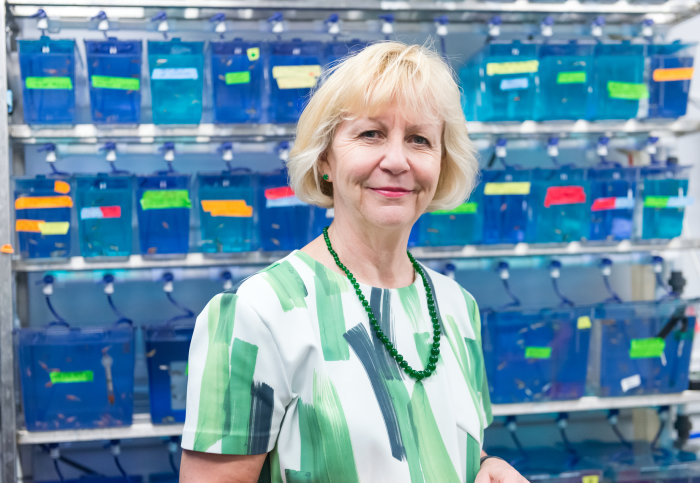
File photo
Editor's note: Professor Maggie Dallman is the vice president of Imperial College London.
The international scientific community has shown great fortitude and endeavor as it responds to the greatest health crisis in more than a century.
We still need to overcome many challenges in the coming weeks and months.
It’s clear that this pandemic cannot be solved by one country or one university but will need collaboration and cooperation from all.
Since the outbreak began, Chinese and British scientists have been bringing their expertise together to fight COVID-19.
Here, at Imperial College London, our community of Chinese scientists and students are making essential contributions in areas such as epidemiology, vaccine development and treatment.
Before the pandemic began, Dr Kai Hu, who is originally from Wuhan, was supported by the Chinese Scholarship Council to come to Imperial to join one of the world’s best vaccine development research groups.
Dr Hu is now playing a critical role in Professor Robin Shattock’s team as they work to develop a vaccine for coronavirus.
Their vaccine development has been expedited by the early research of Chinese scientists in Wuhan who sequenced the genome of the coronavirus.
Dr Hu says his former colleagues in China have been working non-stop since COVID-19 appeared to try and stop its spread.
An important step in managing the pandemic is to find an effective therapy to put health services in a stronger position to cope with any influx of patients.
Imperial’s Prof Xiaoning Xu is working with Hong Kong University to develop antibodies that target the virus.
His team will use these antibodies to develop a potential therapy, with the aim of determining if it can treat a range of coronavirus infections including COVID-19.
Imperial has also led the outbreak modeling which has guided the governments around the world and informed strategies to build healthcare capacity and prevent widespread outbreaks. Imperial’s world-renowned COVID-19 response team, led by Professor Neil Ferguson, includes several Chinese students.
Much of this work could not have progressed without the fantastic contributions from colleagues and partners in China.
Imperial’s Chinese community includes more than 3,000 students and 200 scientists, many of whom are involved on the frontline at the NHS. I am immensely proud of all those who are putting themselves at great risk to help critically ill patients.
I’ve also been inspired by those working in unrelated fields, but have been enthusiastically helping to respond to this health emergency in other ways.
I’ve heard numerous stories of our Chinese community volunteering their time, helping to procure scarce equipment for the NHS, and supporting our students welfare and education.
Imperial and China have always had a strong relationship, built over decades of collaboration.
Many of China's top scientists and leaders, such as former Tsinghua University President and Mayor of Beijing Chen Jining, spent time here as students or have worked with colleagues here on world-leading scientific research.
The UK has benefited greatly from the strengths that Chinese students and scientists have brought with them.
For example, Chinese academics were instrumental in setting up the Data Science Institute at Imperial - which is now a world famous center for data research, and was visited by President Xi during a state visit.
When President Xi visited Imperial, he saw Chinese and British students mix with one another to develop entrepreneurial ideas, create opportunities for economic growth and make the UK and China better places.
Chinese institutions are a great source of innovative ideas, they are wonderful collaborators and Imperial has benefited from strong relationships with Chinese partners such as Tsinghua and other great universities. We recently created an energy research center with Tsinghua, which is helping the UK and China transition to a low-carbon power and energy system.
Last week, Imperial and Tsinghua University hosted an online joint symposium on COVID-19, to discuss ways to move forward in vaccine development, advance diagnostic tools and understand the economic impact of the pandemic. The meeting brought together leading academics from the UK and China and was a great example of how international collaborations can still thrive in this environment.
We must not let the pandemic break these strong links between Chinese and UK science, and institutions such as Imperial.
Chinese students have developed a reputation for innovation, creativity and openness to new ideas. The strongest students have often gained greatly from time spent abroad, learning from other cultures and broadening their experiences.
Imperial is very proud of our Chinese student community – which is our largest international group. They contribute a great deal to our College during their studies and graduate as highly skilled individuals who apply their outstanding intellectual skills to societal challenges.
We are making plans to reopen our campuses for the Autumn term in October and we look forward to warmly welcoming Chinese students to London. We will ensure that our students continue to enjoy a great student experience through a combination of online and on-campus learning, but at all times, their safety will be uppermost in our minds.
The pandemic crisis has caused us to make a number of rapid and profound changes in the ways we work and operate as scientists and as a university. One thing that hasn’t changed is our commitment to working with international colleagues and partners.
Chinese students must continue to study at institutions like Imperial. Our two nations’ great scientists must continue to collaborate to solve global challenges. As we tackle the current pandemic together and work to prepare for future threats, we cannot afford to do anything else.
The views and opinions expressed in this article are those of the author and do not necessarily reflect the policy or position of the People' Daily.


